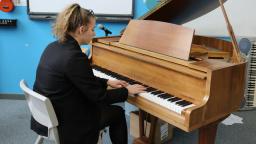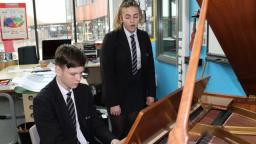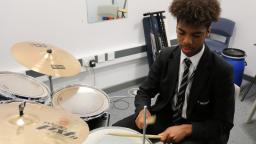Charlotte, Dwight and Finlay are all in Year 11 at Co-op Academy North Manchester. They took part in Exchanging Notes – a project in partnership with local music organisation Brighter Sound – which provided valuable experiences both inside and outside the music classroom during Years 7-9.
They’re now all taking GCSE Music – and they say that the project has played a big role in their musical development, as well as improving their confidence and ability to express themselves.
Exchanging Notes: “I wish it didn’t end!”
The project featured activities ranging from workshops and masterclasses with visiting musicians, to whole-class visits to professional venues – including Manchester’s famed Blueprint Studios, where the group spent a full day composing and recording their own music.
Brighter Sound’s Exchanging Notes project was different from most Youth Music projects in that, to begin with, many of the music-making sessions took place in school. Halfway through the project, the sessions moved to take place outside of school, and for all three young people, this time outside the classroom was a highlight – particularly the full-day sessions, which allowed them to focus and work on their music more than they could at school.

“I feel like, when we walk into the room when we go on a trip or something like that, everybody’s got an idea already,” says Charlotte. “[There’s] more focus, and you’re in a different environment – you’ve got a different area to think in,” adds Dwight.
“Everybody at Brighter Sound’s there to do music, you’re there to make a song,” explains Finlay. He compares this to their current GCSE Music classes, where sometimes not everyone takes the lessons so seriously: “You can’t really get in your element.”
“It’s fun, you meet new people”
Finlay enjoyed having the chance to collaborate and write music with a range of different people on the project. “[It’s] a lot better when there’s other people’s input, because you could be hearing something that they’re not hearing, and they could be hearing something you’re not hearing,” he says.
And the social aspect of music-making is important to all three young people. “You make a lot more friends [from] it,” Finlay reflects, “I did a musical in Year 9, and I met a lot more people through it, and I interacted with people – it wasn’t just in my year, it was older and younger.”
Charlotte now attends another project run by Brighter Sound outside of school: “I asked two of my friends to go with me ‘cos I didn’t want to go on my own, and then we’ve just made a lot more friends.”
“I was proud of myself”
The end of the project was marked by a live performance at Manchester’s renowned live music venue Band on the Wall – a big highlight for all three young people. “That was the best,” recalls Charlotte. “I literally just got to the stage and was like… woah!”
“I was proud of myself,” adds Dwight, “‘cos I’m not used to doing stuff like that, like getting up on stage and performing in front of that many people.”
For Finlay, performing allows him to be himself. He describes how he felt when performing at Band on the Wall: “It’s like you don’t care what other people think of you. A lot of people are restricted in what they’re doing because they care too much about what other people think, but you’re just like ‘I don’t care’.”

“You can be how you want to be.”
Finlay says he’s “a lot different” to how he used to be before starting to make music. “I always had to impress other people, so I would change myself so that I’d fit in – but now I just don’t care what other people think, it’s just not a big part of life.”
He adds: “It allows me to be myself – when I make music, I can be myself. I don’t have to be, like, you know, loud and annoying and stuff. I can just play music in my own way.”
Charlotte adds: “When I taught myself how to sing, I used to mimic the voices of what the artist would be doing, to try and be like them. But since doing Brighter Sound, I feel like I’ve found my own voice.”
Music and the future
All three plan to keep up music after their GCSEs, despite none of them planning to have careers in music. Charlotte wants to be a child psychologist, while Dwight plans to become a pilot. Finlay is undecided as yet but worries that “there’s not many jobs” in music.
However, it’s clear that music will continue to be a big part of their lives. “If you keep music as a hobby you’re still hanging on to that little bit of, like, the way you express yourself,” Charlotte explains.

Dwight says: “I can’t go a day without listening to music… like waking up early in the morning, I straight away put on music, just to get me up in a good mood.” And Finlay adds that without music, “I’d just feel useless. Because I’d just be boring, wouldn’t I!”
Feature

The Sound of
the Next Generation
Check out the full report into the diverse ways young people engage with and value music and music-making, and read more stories from the young musicians we spoke to.
